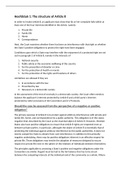Hoofdstuk 1: The structure of Article 8
In order to invoke Article 8, an applicant must show that his or her complaint falls within at
least one of the four interests identified in the Article, namely:
1. Private life
2. Family life
3. Home
4. Correspondence
Next, the Court examines whether there has been an interference with that right or whether
the State’s positive obligations to protect the right have been engaged.
Conditions upon which a State may interfere with the enjoyment of a protected right are set
out in paragraph 2 of Article 8, namely in the interests of
1. National security
2. Public safety or the economic wellbeing of the country
3. For the prevention of disorder or cime
4. For the protection of health or morals
5. For the protection of the rights and freedoms of others
Limitations are allowed if they are
1. In accordance with the law
2. Prescribed by law
3. Necessary in a democratic society
In the assessment of the test of necessity in a democratic society, the Court often needs to
balance the applicant’s interests protected by Article 8 and a third party’s interests
protected by other provisions of the Convention and it’s Protocols.
Should the case be assessed from the perspective of a negative or positive
obligation?
The primary purpose of Article 8 is to protect against arbitrary interferences with private and
family life, home, and correspondence by a public authority. This obligation is of the classic
negative kind, described by the Court as the essential object of Article 8. However, Member
States also have positive obligations to ensure that Article 8 rights are respected even as
between private parties. In particular, althought the object of Article 8 is essentially that of
protecting the individual against arbitrary interference by the public authorities, it does not
merely compel the State to abstain from such interference: in addition to this primarily
negative undertaking, there may be positive obligations inherent in an effective respect for
private life. These obligations may involve the adoption of measures designed to secure
respect for private life even in the sphere of the relations of individuals between themselves.
The principles applicable to assessing a State’s positive and negative obligations under the
Convention are similar. Regard must be had to the fair balance that has to be struck
between the competing interests of the individual and of the community as a whole. Where
, the case concerns a negative obligation, the Court must assess whether the interference was
consistent with the requirements of Article 8 paragraph 2, namely in accordance with the
law, in pursuit of a legitimate aim, and necessary in a democratic society.
In the case of a positive obligation, the Court considers whether the importance of the
interest at stake requires the imposition of the positive obligation sought by the applicant.
Certain factors have been considered relevant for the assessement of the content of positive
obligations on States. Some of them relate to the applicant. They concern the importance of
the interests at stake and whether ‘’fundamental values’’ or ‘’essential aspects’’ of private
life are in issue or the impact on an applicant of a discordance between the social reality and
the law, the coherence of the administration and legal practices within the domestic system
being regarded as an important factor in the assessment carried out under Article 8. Other
factors relate to the impact of the alleged positive obligation at stake on the State
concerned. The question is whether the alleged obligation is narrow and precise or broad
and indeterminate.
As in the case of negative obligations, in implementing their positive obligations under
Article 8, the States enjoy a certain margin of appreciation. A number of factors must be
taken into account when determining the breadth of that margin. Where a particularly
important facet of an individual’s existence or identity is at stake, the margin allowed to the
State will be restricted. Where, however, there is no consensus within the Member States of
the Council of Europe, either as to the relative importance of the interests at stake or as to
the best means of protecting it, particularly where the case raises sensitive moral or ethical
issues, the margin will be wider. There will also often be a wider margin if the State is
required to strike a balance between competing private and public interests or Convention
rights.
While the choice of the means to secure compliance with Article 8 in the sphere of
protection against acts of individuals is, in principle, within the State’s margin of
appreciation, effective deterrence against grave acts, where fundamental values and
essential aspects of private life are at stake, requires efficient criminal law provisions.
In respect of less serious acts between individuals, which may violate psychological integrity,
the obligation of the State under Article 8 to maintain and apply in practice an adequate
legal framework affording protection does not always require that an efficient criminal law
provision covering the specific act to be in place. The legal framework could also consist of
civil law remedies capable of affording sufficient protection. Moreover, as regards the right
to health, the Member States have a number of positive obligations in this respect under
Article 2 and 8.
The Court also articulated the State’s procedural obligations under Article 8, which are
particularly relevant in determining the margin of appreciation afforded to the member
State. The Court’s analysis includes the following considerations: whenever discretion
capable of interfering with the enjoyment of a Convention right is conferred on national
authorities, the procedural safeguards available to the individual will be especially material
in determining whether the respondent State has, when fixing the regulatory framework,





